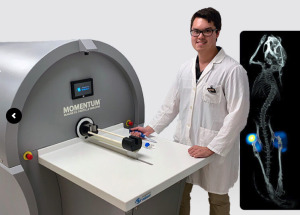by
John R. Fischer, Senior Reporter | October 14, 2022

City of Hope in Los Angeles has installed Magnetic Insight's Momentum MPI system. (Photo courtesy of Magnetic Insight)
Magnetic Insight has finished setting up its Momentum MPI scanner at City of Hope’s preclinical research facilities in Los Angeles, where it will be used in studies on cancer, diabetes and other life-threatening diseases.
MPI, or Magnetic Particle Imaging, directly detects magnetic nanoparticle tracers and can perform non-radiative 3D perfusion angiography. It distinguishes contrast better than MR, CT and nuclear medicine scanners and has the potential to be used in new applications for deep-tissue imaging.
One of these applications is direct monitoring of cell therapy, which is not feasible with other scanners. City of Hope seeks to do this to capture cellular-level information that can give physicians insights that improve their clinical management decisions.



Ad Statistics
Times Displayed: 136626
Times Visited: 7924 MIT labs, experts in Multi-Vendor component level repair of: MRI Coils, RF amplifiers, Gradient Amplifiers Contrast Media Injectors. System repairs, sub-assembly repairs, component level repairs, refurbish/calibrate. info@mitlabsusa.com/+1 (305) 470-8013
"In the future, the high-contrast images from MPI will enable clinicians to see where cell therapies are falling short in treating solid tumors, and adjust treatment regimens accordingly,” said Patrick Goodwill, CEO and co-founder of Magnetic Insight, in a statement.
Among the information that MPI can collect is cell therapy location, migration, persistence and quantity, all critical measures for determining the efficacy of a cell therapy.
City of Hope will scan animal models with the system to collect pathophysiology data for assessing imaging protocols and cell therapies being used in clinical research applications.
Magnetic Insight has installed preclinical scanners worldwide and is beginning to bring its technology into clinical settings.
In 2019, the National Institute of Drug Abuse of the National Institutes of Health awarded it $1.8 million to
develop a clinical-scale neurovascular MPI system over a two-year period. The contrast, safety and speed of MPI allows it to overcome limitations of current neurovascular imaging protocols for diagnosing, staging and monitoring diseases such as stroke, aneurysms, and other vaso-malformations.
The NIH again granted it $1.6 million in 2020
for the study of color MPI, which provides new image contrast to MPI images to improve overall contrast for clinicians to better diagnose high-mortality diseases such as cancer, cardiovascular disease and stroke.

